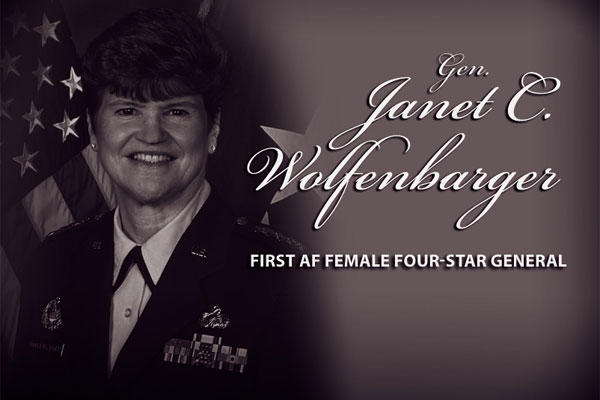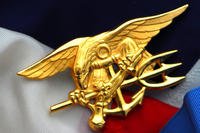FORT MEADE, Md. -- Young Janet Libby was definitely someone going places at Beavercreek High School near Dayton, Ohio. She was in the National Honor Society, on both the German and Ski clubs and a soccer athlete as well.
But even those friends and well-wishers who would have signed her senior yearbook with words like "you'll go far," and "you'll be a success in life," could never have imagined that the young daughter of an Air Force pilot would go on to become the first female in the Air Force to attain the rank of four-star general, and only the second in military history.
Today, Gen. Janet C. Wolfenbarger has come full circle from those Beavercreek roots as the commander of the Air Force Materiel Command, a major command at Wright-Patterson Air Force Base, just a few miles from where she graduated from high school. She is responsible for more than 80,000 Airmen and civilians worldwide, along with a $60 billion annual budget, leading an organization that supports the warfighting efforts through state-of-the-art technology, weapon systems management, systems development and evaluation and a global supply-chain management system.
It didn't take long following her graduation from high school for Wolfenbarger to make her mark. After a suggestion from her dad a year earlier, she applied and was accepted in 1976 into the first class at the Air Force Academy to accept women.
"The Air Force Academy was an opportunity for me to be stretched in so many ways: physically, mentally and emotionally," said Wolfenbarger at a women's conference in San Diego in 2011. "It was an opportunity to prove to myself that, in fact, I could withstand those kinds of experiences, and come out on the other end realizing that I was far more capable than I ever thought I would be. The experience gave me a belief in myself that I have relied upon ever since."
Commissioned as a second lieutenant in 1980, she has spent most of her career in the acquisition field, leaving her imprint on the purchase, testing and implementation of the F-22 Raptor, the B-2 Spirit and the C-17 Globemaster III programs. She went on to earn a master's degree from the Massachusetts Institute of Technology (MIT) in aeronautics and astronautics.
Although Wolfenbarger is proud of her accomplishments and the direction women are headed in the Air Force, she said that she never wanted to be recognized for simply being a woman. "I wanted to do well and be recognized because I worked hard," said Wolfenbarger. "I did the very best I could at every job I held."
During the early 1980s, when Wolfenbarger was in the early stages of her career, she told stories of women who could be discharged for getting pregnant or even adopting a child. There were also many more career fields closed to women at the time. She believes that over the past three decades, women have made tremendous strides.
"We now have, not only maternity leave, but also paternity leave for our service members," she said. "Also, when I joined, there were a host of career fields closed to women, but we can now, as a service, proudly say that we have 97 percent of our career fields open to women."
Even though Wolfenbarger believes many women entering the Air Force today may take for granted their equal status, she said there are still areas of progress yet to be overcome.
"I think one of our challenges when we serve our country is that there is such a drive to support our nation in whatever mission we are assigned. I think there has to be a constant reminder that we all have to search for that work and life balance because, in the end, it is our families, our friends and our health that we have to rely on when our careers are over."




























